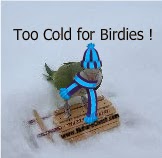With all the severe cold this week, and record breaking temperatures in my own southern area, evaluating all emergency rations and supplies are so very important.
For me Basic must haves for winter time emergency preparation:
1. Flashlight and fresh batteries
2. Sufficient number of carriers or small travel cages
3. Water
4. Extra food & treats for birds, cats, dog, and human
5. Extra blankets in case of power outage
6. Hand towel for catching bitey bird in possible panic mode
7. Paper Towels
8. First Aid Kit
9. Emergency vet numbers

I actually have several flashlights placed throughout my home for emergency situations for any time of year. I make sure one is always located just inside the door to the bird room.

I have multiple small carriers, and a few small sleep or travel cages stored. I allot 2 small crocks per carrier or cage and either store the dishes with the carrier, or have a bag containing extras stored in the carrier area.
For water, I recycle plastic milk jugs by cleaning them, letting them completely air dry, and then filling with drinking water and placing in my large freezer. If you are not lucky enough to have a separate large freezer, or even much room in your refrigerator freezer, keep at least one case of purchased bottled water on hand for immediate emergency use. Although some birds such as cockatiels can do just fine without water for a couple of hours, other birds, especially birds such as canaries, cannot go without water for more than a very short period of time.
I keep an an extra bag of seed or pellets, or combination of both, either in my freezer, or in air tight containers. I also like to keep some treats such as spray millet, nutriberries, etc. on hand for an emergency occurrence. After placing a bird into their carrier or small cage, the treat helps them focus on something good and not worry about why they are in the emergency housing.
I also keep extra dog and cat food on hand as well as some treats. Keeping some granola bars and such on hand for myself, helps me feel better prepared and part of the team.
Those blankets, quilts, large towels, and such, are an absolute necessity as they can be spread across carriers, cages, to help hold in heat and provide a more quiet and darkened atmosphere to help relieve stress on the birds. Not to mention, wrapping up in a nice warm fleece blanket with the dog, would help relieve my own stress level.
I always keep a small towel handy in the bird room for use any time needed. Some of my rescued birds are not super tame, and would not willingly step up and go quietly into a carrier. To prevent stress to these birds, I can easily scoop them up with a towel, deposit them into the waiting carrier, and give them their treat. No fuss no muss with trying to coax an unwilling bird to cooperate with my idea of what needs to happen.
Paper towels can be used in the bottom of the carriers for easier cleanup, not to mention it definitely gives some of my birds playtime while they shred and demolish the paper towels.

My first aid kit includes not only bird related necessities, but a few extras for me as well.
Emergency vet numbers on hand in my first aid kit just in case.
I have a closet that is designated the bird closet as it houses the carriers, and a stack of extra blankets and covers. I also keep bird safe unscented candles on hand. When using candles, always be sure they are safe to be used around your birds. Wonderful fragrant smelling candles, are generally not safe to use around your birds. Simple plain wax candles are preferred. Extra safety whenever using open flames such as candles, of course, should be considered.
Luckily, our recent winter blast brought no power outage, and birds were all snug in their own cages. All other critters, including one green tree frog, knew no worries at all.
 If you are like me, you are oh so ready to spring into some warmer weather.
If you are like me, you are oh so ready to spring into some warmer weather. 












